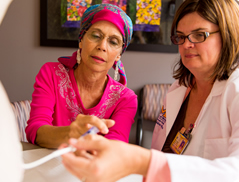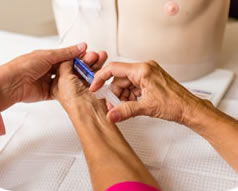Diagnosis First Treatment Next

Photo Credit: Edda Pacifico
Education to help Rogel Cancer Center patients manage home-related treatment
You just learned that you have cancer and need to begin chemotherapy as soon as possible. The idea of being sick is overwhelming. For the first time, you question your mortality. Just as you begin to think about how you’re going to tell your family, you realize the doctor is saying something about a chemotherapy pump you’ll wear at home. Paying attention would be great, but your mind is racing. Thankfully, you hear the doctor say they’re sending you to a Rogel Cancer Center clinic where skilled nurses will teach you everything you need to know.
To ensure that Rogel Cancer Center patients are informed and prepared for home-related treatment, the Rogel Cancer Center Education Clinic houses five nurse educators who meet with patients one-on-one to discuss treatment plans and any home care that’s required. The nurse educators give patients thorough training to be confident and able to perform any and all tasks required to ensure successful treatment. Nursing supervisor Marie Richards, R.N., B.S.N., explains that getting a cancer diagnosis and understanding treatment are two very different things.
"It's a separate kind of coping," Richards says. "Patients are overwhelmed during their physician appointment when they hear they have cancer and need treatment. We offer a quiet, patient-friendly place for them to learn how to actually manage their treatment."
As cancer care advances and more treatment options become available, many cancer patients are finding themselves responsible for managing some aspect of their care from home. This can be overwhelming, whether it involves wearing a home chemotherapy pump, giving yourself an injection or keeping a catheter or pick line clean. In some cases, patients begin treatment immediately following diagnosis, before they have time to process the information or think of questions to ask.

"When you're new to chemo, a patient is scheduled in the Rogel Cancer Center Education Clinic," Richards says. "We also see patients who have gone through a change in treatment. We try to capture every patient with something new to learn."
Patients receive written materials specific to their treatment, as well as guidance to handle questions and issues that arise.
"A lot of our job is helping people manage the anxiety associated with their treatment," Richards says. "We give them tools to manage their biggest fears, especially who to call if something happens late at night or outside of regular business hours."
The five nurse educators at the Education Clinic aim to be a valuable source of information for patients and a positive contact whom patients can call with questions.
"When you tell a patient they're going to go home on a pump, they’re often very scared," says Louise Rushlow, R.N., one of the Education Clinic nurses. "Patients are apprehensive. We're there to help reassure."
Continue reading the Fall, 2014 issue of Thrive
